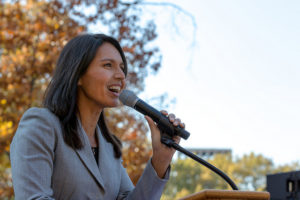Rules Are for Schmucks: The Gabbard Pander
 Rep. Tulsi Gabbard (photo by Lorie Shaull)
Rep. Tulsi Gabbard (photo by Lorie Shaull) Rep. Tulsi Gabbard (D-HI) captured headlines earlier this month by slamming her fellow Democrats for “fomenting religious bigotry” in a column published at The Hill. Riding a crest of Christian Right enthusiasm, she announced her candidacy for the presidency a few days later.
What Gabbard was trying to exploit was some valid questioning of one of President Trump’s judicial nominees, Brian Buescher. Three Democrats on the Senate Judiciary Committee (the two senators from California, Diane Feinstein and Kamala Harris, and Mazie Hirono of Hawaii) submitted written questions to Buescher in December. As is typical, the senators asked questions about the nominee’s memberships in various organizations, which can provide clues about a person’s views. For example, they asked Buescher about his membership in the Federalist Society, a group that advocates an “originalist” interpretation of the Constitution. They were trying to probe the extent to which Buescher’s views mirror or are influenced by the views of this organization, as part of investigating whether they should vote for his confirmation. This is called “doing their job.” Neither Gabbard nor any other commentator I have seen complained about this line of questioning.
Feinstein, Harris, and Hirono then asked Buescher about his membership in another advocacy organization: the Knights of Columbus. Their purpose was the same as before: to probe the extent to which Buescher’s views mirror or are influenced by the positions of the Knights of Columbus.
A little background on this religious organization is in order. The group was founded in the US in 1882 and quickly took up the position as the Catholic Church’s “strong right arm” for political causes. In the 1920s, for example, the Knights zealously promoted the “Cristero War,” an armed Catholic insurrection against the Mexican government for the sin of providing religiously neutral education. Many thousands died on both sides.
In the 1930s, the Knights vigorously backed General Francisco Franco’s Catholic coup against the elected government in Spain. They fought successfully for a US arms embargo to prevent that democratic government from defending itself while Benito Mussolini and Adolf Hitler tore the country apart. Hundreds of thousands died during the war and in Franco’s totalitarian purges afterward, while Spain plunged into thirty-five years of darkness.
If you like having the words “under God” in our Pledge of Allegiance, you can thank the Knights of Columbus. They launched a successful lobbying campaign in the 1950s that led to this change, in part by simply adding the words themselves at every turn. Those of us who can’t say those words in good conscience are unworthy of patriotism, in the Knights’ view.
Since the 1970s, the Knights of Columbus have been at the forefront of political efforts to re-criminalize abortion. Their supreme knight insisted in the last presidential election that good Catholics cannot vote for anyone who supports a woman’s right to choose, regardless of the candidate’s position on any other issue. From 2005 to 2012 the organization spent nearly $16 million battling against the right to same-sex marriage.
It’s hard to think of any line of questioning more relevant for a judicial nominee than “Why’d you join a group like that? Are your views the same as theirs? How closely do you adhere to what they say? What does your membership tell us about you?” In fact, the exact same line of questioning the senators used for the Federalist Society.
Unlike the Federalist Society, however, the Knights of Columbus are religious as well as political. In Gabbard’s view, this is the golden ticket that exempts them from all scrutiny. Any questioning about them constitutes “religious bigotry.” In her column at The Hill she goes so far as to link such questioning to the “horrible potential consequence of prejudice and bigotry,” including the recent shootings at synagogues and mosques and the sectarian genocide in Iraq.
Gabbard slams unnamed Democrats for “citing as disqualifiers Buescher’s Catholicism,” equating the Knights’ questioning to an unconstitutional “religious test for office.” I’ve read everything I can find about this incident, and I’ve not seen a single case of anyone citing Buescher’s religion as a disqualifier. There are millions of Catholics, including lots of my relatives, who manage to get along quite nicely without paying dues to a Far-Right outfit like the Knights of Columbus. The three senators in question routinely vote to confirm Catholic nominees, in Feinstein’s case probably hundreds of times. Gabbard is apparently just making this insult up because it plays well.
In the 1920s there was another prominent national organization that mixed religion with politics—the Ku Klux Klan. Its explicit aim was to protect Protestantism, especially from Catholics. Thirty-thousand Protestant ministers belonged to the organization, including three-fourths of the delegates to the Southeastern Baptist Convention. Two thirds of its paid lecturers were Protestant clergy. Another Democratic presidential candidate, William Jennings Bryan, led the battle at the 1924 Democratic national convention against a resolution condemning this religious organization, which he won by a single vote.
The Knights of Columbus is not the same as the Ku Klux Klan. It’s more benign in many ways, though I could argue it’s worse in others. There are other radical religious organizations out there as well, such as the Nation of Islam and the Jewish Defense League. The religious orientation of these organizations should not shield anyone from questions about membership in them.
Gabbard’s pander is receiving glowing praise from Newt Gingrich, Todd Starnes, the Christian Post, and plenty of other right-wing outlets. I see almost no one stepping up to defend Feinstein, Harris, and Hirono for asking highly legitimate questions of a judicial nominee.
Gabbard is reading from a well-worn political playbook: making statements with no basis in fact, stoking irrational fear, and fawning on the God industry. We already have one demagogue in the White House‑we don’t need another.
